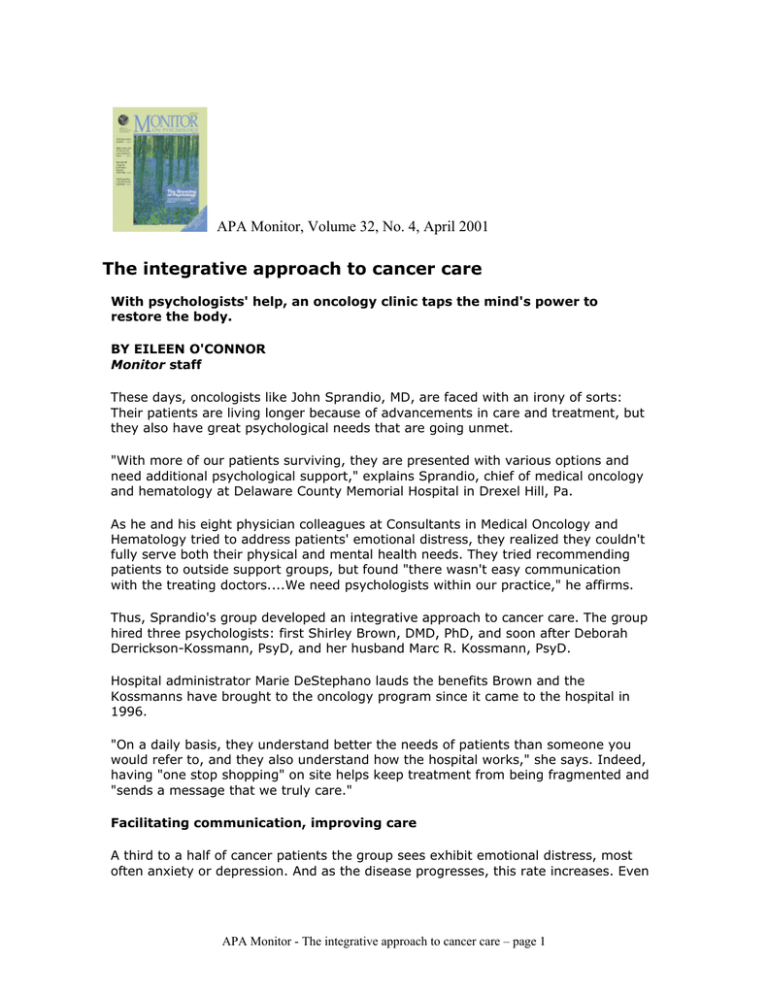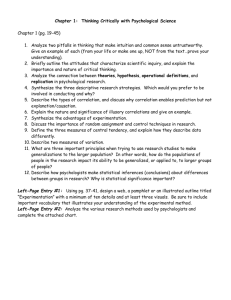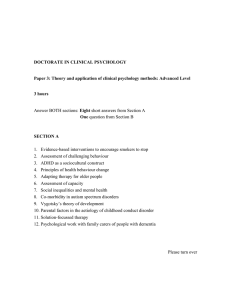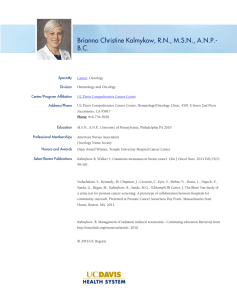The integrative approach to cancer care
advertisement

APA Monitor, Volume 32, No. 4, April 2001 The integrative approach to cancer care With psychologists' help, an oncology clinic taps the mind's power to restore the body. BY EILEEN O'CONNOR Monitor staff These days, oncologists like John Sprandio, MD, are faced with an irony of sorts: Their patients are living longer because of advancements in care and treatment, but they also have great psychological needs that are going unmet. "With more of our patients surviving, they are presented with various options and need additional psychological support," explains Sprandio, chief of medical oncology and hematology at Delaware County Memorial Hospital in Drexel Hill, Pa. As he and his eight physician colleagues at Consultants in Medical Oncology and Hematology tried to address patients' emotional distress, they realized they couldn't fully serve both their physical and mental health needs. They tried recommending patients to outside support groups, but found "there wasn't easy communication with the treating doctors....We need psychologists within our practice," he affirms. Thus, Sprandio's group developed an integrative approach to cancer care. The group hired three psychologists: first Shirley Brown, DMD, PhD, and soon after Deborah Derrickson-Kossmann, PsyD, and her husband Marc R. Kossmann, PsyD. Hospital administrator Marie DeStephano lauds the benefits Brown and the Kossmanns have brought to the oncology program since it came to the hospital in 1996. "On a daily basis, they understand better the needs of patients than someone you would refer to, and they also understand how the hospital works," she says. Indeed, having "one stop shopping" on site helps keep treatment from being fragmented and "sends a message that we truly care." Facilitating communication, improving care A third to a half of cancer patients the group sees exhibit emotional distress, most often anxiety or depression. And as the disease progresses, this rate increases. Even APA Monitor - The integrative approach to cancer care – page 1 if they are cured, 10 to 15 percent still cannot emotionally adjust to their diagnosis, Sprandio reports. The psychologists at Consultants in Medical Oncology and Hematology provide a constructive range of services to help patients restore balance to their disrupted lives. The goal is to ensure that patients' spirits--their source of both peace and pluck--remain intact. "Each person has his or her own way to respond to this crisis," explains Brown. "Our job is to determine where they are and help them adjust in their own unique way." In addition to individual therapy sessions in which patients learn to cope with fears and choose the best treatment for their diagnosis, the practice also offers family counseling and group therapy. They make stress management a fundamental component of care: In that vein, Kossmann leads an eight-week class that teaches mindfulness meditation, yoga and cognitive behavioral strategies to reduce stress. Patients can also take advantage of a massage therapist and a free weekly yoga class, in addition to a specialized program to treat patients with lymphedema. The psychologists may also employ hypnosis to help people harness the strengths of the mind over the body's pain. Perhaps most significant, however, is the community the psychologists have created. "I might sit with patients and oncologists in the exam room," says DerricksonKossmann. "If a patient has difficulty dealing with an aspect of treatment, I can help explain this to the doctor." "The most important thing the psychologists have done," Sprandio remarks, "is facilitated communication between patients and doctors." He believes that the psychological support enables patients to be more involved in making decisions about their own treatment, which translates into better compliance. And, says Sprandio, "When a patient is compliant with the care plan, they are likely to do better." Meanwhile, the psychologists say they have enjoyed learning more about medicine in order to bridge the communication gap between oncologist and patient. Although Kossmann admits that at first he was uncomfortable seeing patients in the chemotherapy suite, outside the private setting of an office. Nevertheless, he says, "you learn to stretch your abilities and be adaptive to patients needs." Providing integrated care has also made the psychologists stronger advocates for prescription privileges. "The doctors would like us to tell them what kind of medications to put patients on for anxiety or depression," Derrickson-Kossmann says, "and the ability to make APA Monitor - The integrative approach to cancer care – page 2 those kinds of recommendations would be a tremendous help." The future Delaware County Memorial Hospital has been so pleased with Sprandio's integrated care model that they recently established the Center for Integrative Cancer Care, providing additional complementary treatment options for oncology patients. The hospital offers acupuncture, art therapy, horticultural therapy, and cooking and fatigue-management classes as part of the comprehensive approach to cancer care. "We see it as something we can do," says hospital administrator DeStephano. Integrative Cancer Care is "a big cooperation effort, and it's working." Indeed, Brown adds, "we have created a climate in the practice where everyone-from the physicians to the front desk staff--are attuned to the psychological needs of our patients and help steer them toward support services." The psychological component of such cancer care is not, however, readily recognized by insurance companies. "We hope that by collecting data we may be able to convince insurance companies to support some of our efforts for their patients," says Sprandio. "Someday we hope to have enough clout to show the insurance companies that patients do better with psychological services, that they should be folded into oncology care," notes Kossmann. Sprandio is quick to add, though, that his group is committed to financially supporting all of the complementary components of their integrated practice. Success is measured by patient satisfaction. "Our patients recognize it as a quality service, and thus it has been of tremendous value to the practice," he observes. And the enormous strides the group makes with patients help them maintain a firm course in what can be an emotionally challenging practice. "This work has great impact, which offsets the sadness," says Brown. "People are having many breakthroughs and doing such brave and powerful work--being a part of that is really such a privilege." APA Monitor - The integrative approach to cancer care – page 3







